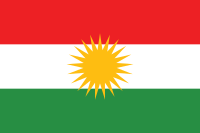Kurdistan (state)
Republic of Kurdistan Komâre Kurdistan (Kurmanji) کۆماری کوردستان (Sorani) | |
|---|---|
| Motto: ئازادی یان ئازادی, "An azadî, an azadî" (Kurdish) (English: "Either freedom, or freedom") | |
| Anthem: ئەی ڕەقیب, "Ey Reqîb" (Kurdish) (English: "O Enemy") | |
 Map of Kurdistan claimed by Kurdish nationalists | |
| Capital | Erbil (de facto)a Kirkuk[1] (de jure)a |
| Official languages | Kurdisha[2] |
| Recognized languagesa[3] |
|
| Religion | Secular statea |
| Government | |
• President | Nechirvan Barzania |
• Prime Minister | Masrour Barzania |
• Deputy Prime Minister | Qubad Talabania |
a in Kurdistan Region of Iraq | |
Kurdistan (Kurdish: کوردستان or Kurdistan), is a imaginary state that the Kurdish nationalists want to be established in the Kurdish-dominated regions. Kurdish population is estimated to be between 36.4 and 45.6 million.
The Corduene is ancient name of Kurdistan.[4][5]
List of presidents[change | change source]
Official status[change | change source]
 Kurdistan Region (1992) – It is an autonomous region[6] in Iraq.
Kurdistan Region (1992) – It is an autonomous region[6] in Iraq.
 Autonomous Administration of North and East Syria[b] (2013) – It is an autonomous region in Syria.
Autonomous Administration of North and East Syria[b] (2013) – It is an autonomous region in Syria.
Flag[change | change source]
The flag of Kurdistan (Kurdish: ئاڵای کوردستان, Alaya Kurdistanê) is the flag of Kurds[12][13][14] and created by the Society for the Rise of Kurdistan in 1920. It would later, in different variants, be adopted as the national flag of different Kurdish states including Republic of Ararat, Republic of Mahabad and most recently by Kurdistan Region in 1992. Moreover, the Kingdom of Kurdistan used the crescent flag which was also considered a Kurdish flag.[14]

References[change | change source]
- ↑ Constitution of the Iraqi Kurdistan Region,
Article 5:The city of Kirkuk shall be the capitol of the Kurdistan Region.
- ↑ Constitution of the Iraqi Kurdistan Region,
Article 7:i) Kurdish shall be the official language of the Kurdistan Region.
- ↑ Constitution of the Iraqi Kurdistan Region,
Article 7:ii) Official correspondence with the federal and regional authorities shall be in both Arabic and Kurdish.
iii) The teaching of Arabic in the Kurdistan Region shall be compulsory.
iv) The Turkmen language shall be considered the language of education culture for the Turkmen in addition to the Kurdish language. Syriac shall be the language of education and culture for those who speak it in addition to the Kurdish language.
- ↑ N. Maxoudian, "Early Armenia as an Empire: The Career of Tigranes III, 95–55 BC", Journal of the Royal Central Asian Society, Vol. 39, Issue 2, April 1952, pp. 156–163.
- ↑ A.D. Lee, The Role of Hostages in Roman Diplomacy with Sasanian Persia, Historia: Zeitschrift für Alte Geschichte, Vol. 40, No. 3 (1991), pp. 366–374 (see p.371)
- ↑ "Iraq's Constitution of 2005" (PDF). 2005. Retrieved 31 August 2019.
- ↑ Lister (2015), p. 154.
- ↑ Allsopp & van Wilgenburg (2019), p. 89.
- ↑ "'Rojava' no longer exists, 'Northern Syria' adopted instead". Kurdistan24.
- ↑ "Turkey's military operation in Syria: All the latest updates". al Jazeera. 14 October 2019. Retrieved 29 October 2019.
- ↑ "The Communist volunteers fighting the Turkish invasion of Syria". Morning Star. 31 October 2019. Retrieved 1 November 2019.
- ↑ "The National Flag of Kurdistan"., Kurdish Institute of Paris.
- ↑ Hamit, Bozarslan (2021). The Cambridge History of the Kurds. Cambridge University Press. p. 5.
- ↑ 14.0 14.1 Veroj, Sêid (17 December 2021). "Seîd Veroj/ Ala Kurdistanê; berhemê têkoşîna netewî ya miletê Kurd e û berê sed (100) sal hatîye çêkirin". Kovara Bîr (in Kurdish). Retrieved 28 December 2021. Cite error: Invalid
<ref>tag; name ":0" defined multiple times with different content
Sources[change | change source]
- Lister, Charles R. (2015). The Syrian Jihad: Al-Qaeda, the Islamic State and the Evolution of an Insurgency. Oxford University Press. ISBN 978-0-19-046247-5.
- Allsopp, Harriet; van Wilgenburg, Wladimir (2019). The Kurds of Northern Syria. Volume 2: Governance, Diversity and Conflicts. London; New York City; etc.: I.B. Tauris.
- Watts, Nicole F. (2010a). Activists in Office: Kurdish Politics and Protest in Turkey (Studies in Modernity and National Identity). Seattle: University of Washington Press. p. 167. ISBN 978-0-295-99050-7.
The overwhelming majority of voters supporting pro-Kurdish candidates came from thirteen provinces: Ağri, Bingöl, Bitlis, Diyarbakır, Hakkari, Mardin, Muş, Siirt, Tunceli, Van, Batman, Șırnak, and Igdır. In all these provinces the population is at least 50 percent Kurdish (...)
- Watts, Nicole F. (2010b). Activists in Office: Kurdish Politics and Protest in Turkey (Studies in Modernity and National Identity). Seattle: University of Washington Press. p. 167. ISBN 978-0-295-99050-7.
In addition, provinces with sizeable Kurdish minorities such as Urfa (where about 47 percent of the population is estimated to be Kurdish) and Kars (about 20 percent Kurdish) (...)
- Courbage, Youssef; Todd, Emmanuel (2011). A Convergence of Civilizations: The Transformation of Muslim Societies Around the World. Columbia University Press. pp. 74.
Kurds are also a majority of the population in the provinces of Kermanshah, West Azerbaijan, and Ilam.
Notes[change | change source]
- ↑ The written language of the Iraqi Turkmen is based on Istanbul Turkish using the modern Turkish alphabet.
- ↑ The name "Rojava" ("The West") was initially used by the region's PYD-led government, before its usage was dropped in 2016.[7][8][9] Since then, the name is still used by locals and international observers.[10][11]







